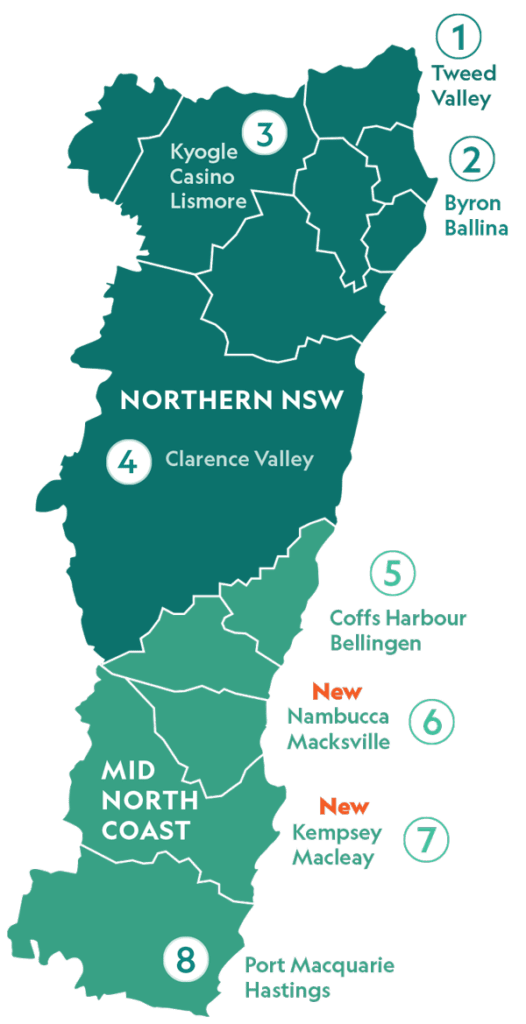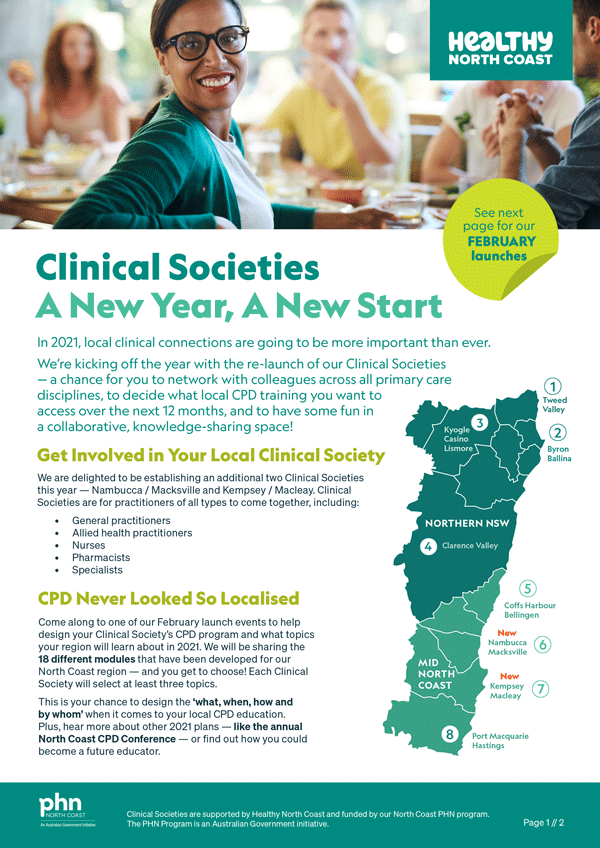In 2021, local clinical connections are going to be more important than ever.
Healthy North Coast is kicking off the year with the re-launch of our Clinical Societies — a chance for you to network with colleagues across all primary care disciplines, to decide what local CPD training you want to access over the next 12 months, and to have some fun in a collaborative, knowledge-sharing space!
We invite you to join your colleagues for breakfast at one of seven events across our region to help design your local clinical society’s CPD program.
Read more below or click here to RSVP to your local Clinical Society event.
Get Involved in Your Local Clinical Society
Healthy North Coast is asking practitioners of all types to come together over breakfast in February to launch our newly designed Clinical Society program.
Make sure you RSVP today if you are a:
- General practitioner
- Allied health practitioner
- Nurse
- Pharmacist, or
- Specialist
We are delighted to also be establishing an additional two Clinical Societies this year — Nambucca / Macksville and Kempsey / Macleay.
"The establishment of a Nambucca/Macksville clinical society is an important step for the Nambucca Valley,” says Urunga Medical Centre GP, Dr Tim Francis.
“The society will be helpful for clinicians in building communities of practice as well as providing additional incentive for potential clinicians considering moving to the area. Furthermore, I expect that the better coordination of education will support greater communication between health care providers and ultimately improve the health outcomes of one of our country’s most disadvantaged communities.
Having clinical education delivered in smaller, watershed areas like the Nambucca Valley will significantly improve access to face to face education events for clinicians who have traditionally needed to travel to the larger town of Coffs Harbour with only occasional local events.
As the education topics will be responsive to the needs of the local community as well as local clinicians, I would encourage all of my colleagues to attend to ensure that their voice is heard, and this opportunity is not missed.”
CPD Never Looked So Localised
And breakfast is on us!
Come along to your nearest Clinical Society breakfast launch in February and help design your Society’s CPD program.
We’ll be sharing 18 different modules that have been developed based on the Healthy North Coast Needs Assessment* and you get to choose! Each Clinical Society will start by choosing at least three topics.
This is your chance to design the ‘what, when, how and by whom’ when it comes to your local CPD education. Plus, hear more about other 2021 plans — like the annual North Coast CPD Conference, Communities of Practice, HealthPathways, Primary Care Impact and the Centre for Healthcare Knowledge & Innovation.
No collaborative, knowledge-sharing space would be complete without a little speed networking, so we’ll be having that too!
Healthy North Coast takes your safety seriously. All our event venues are COVID safe and a COVID safety plan has been developed and registered with the NSW Government. Do not attend if you are feeling unwell or have been in an area where COVID-19 has been present, or in proximity of someone who has COVID-19.
*The Healthy North Coast CPD Needs Assessment is developed through various lines of communication with primary care clinicians and the broader North Coast community. This includes:
- Communication through the Primary Health Coordinators
- Ongoing advisory committee meetings
- Participation in local forums
- Event requests and evaluation surveys
- Large-scale community surveys
- Primary health data analysis
- The monitoring of state and national health data
The goal of the Needs Assessment is to identify gaps in knowledge, skills or capabilities so that Workforce Program priorities are best targeted in supporting clinicians to deliver high quality health care that meets best practice guidelines and latest research and evidence.
Kempsey/Macksville
Thanks to all who have been involved in the Kempsey/Macksville Clinical Society planning that is already underway. Please get in touch with Bronwyn (below) if you would like to join this Clinical Society and register for future events.
For all Clinical Society enquiries, please contact:
Bronwyn Thirkell
0437 027 751
[email protected]





